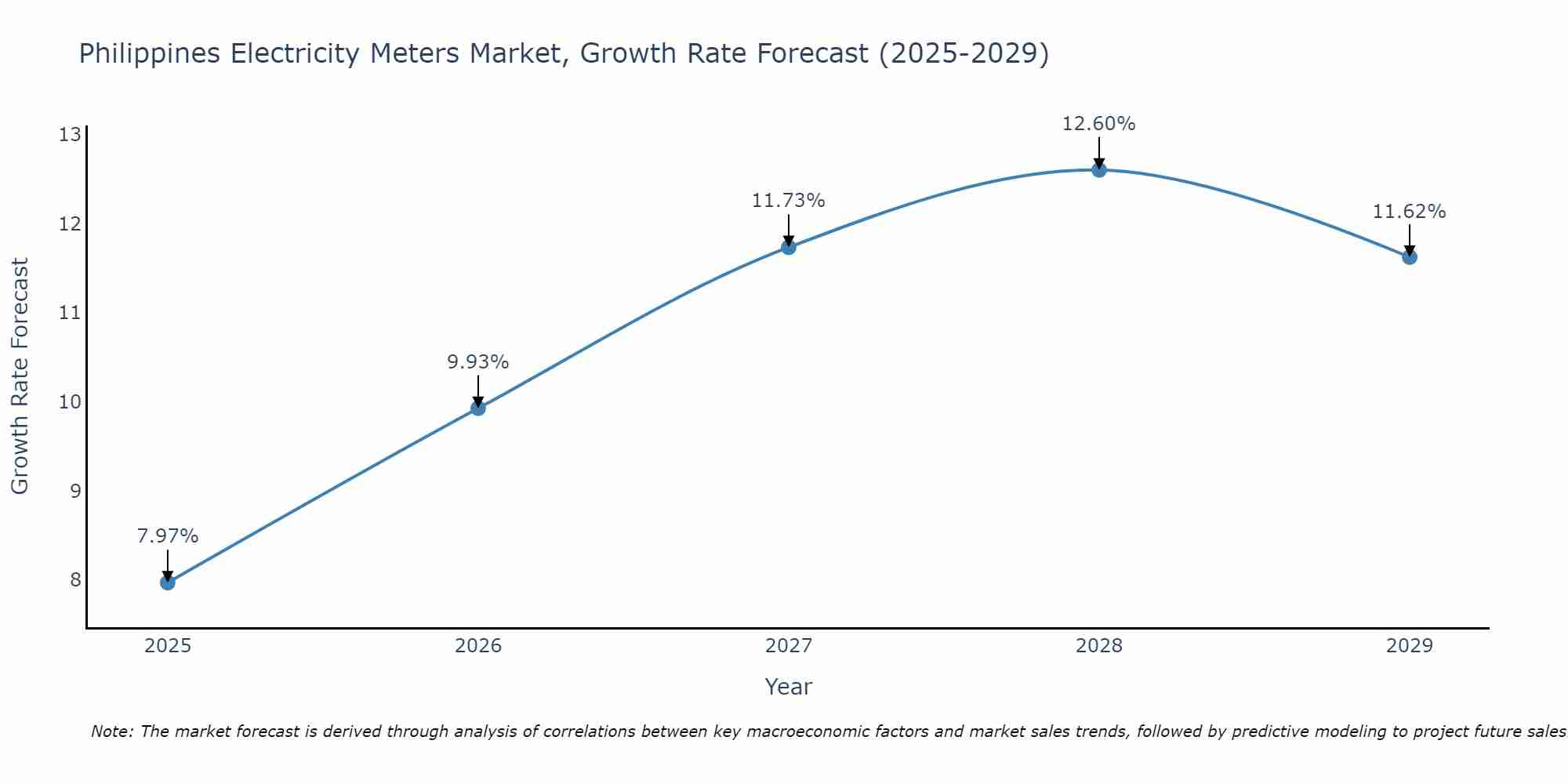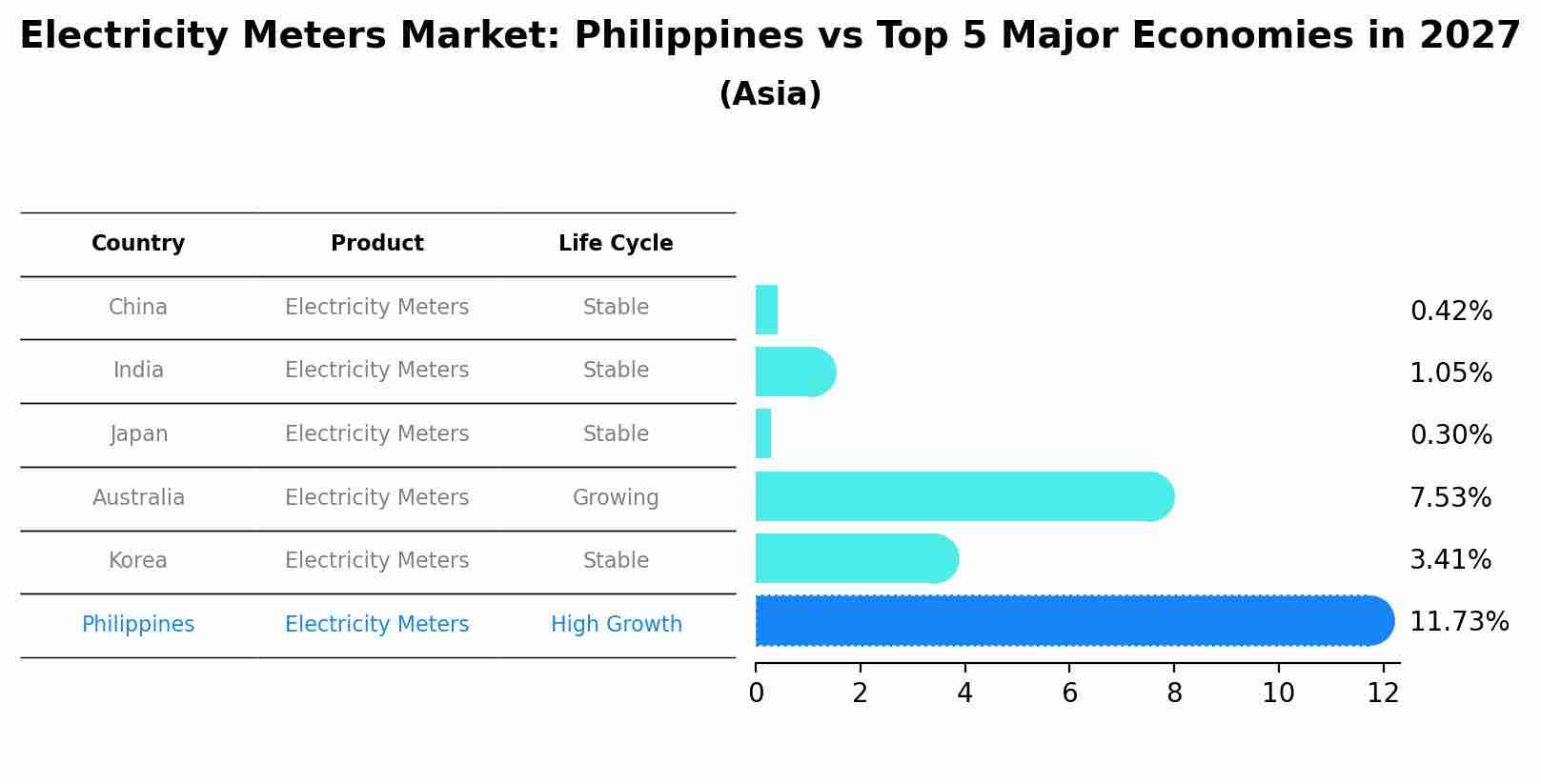Philippines Electricity Meters Market (2025-2031) Outlook | Analysis, Revenue, Size, Value, Trends, Share, Companies, Industry, Forecast & Growth
| Product Code: ETC432925 | Publication Date: Oct 2022 | Updated Date: Apr 2025 | Product Type: Market Research Report | |
| Publisher: 6Wresearch | Author: Ravi Bhandari | No. of Pages: 75 | No. of Figures: 35 | No. of Tables: 20 |
Philippines Electricity Meters Market Size Growth Rate
The Philippines Electricity Meters Market is projected to witness mixed growth rate patterns during 2025 to 2029. Growth accelerates to 12.60% in 2028, following an initial rate of 7.97%, before easing to 11.62% at the end of the period.

Electricity Meters Market: Philippines vs Top 5 Major Economies in 2027 (Asia)
By 2027, the Electricity Meters market in Philippines is anticipated to reach a growth rate of 11.73%, as part of an increasingly competitive Asia region, where China remains at the forefront, supported by India, Japan, Australia and South Korea, driving innovations and market adoption across sectors.

philippines electricity meters market Synopsis
The electricity meters market in the Philippines is undergoing transformation due to the country`s commitment to modernizing its energy infrastructure. The transition towards smart grids and efficient energy management has fueled the demand for advanced electricity metering solutions. These meters not only accurately measure energy consumption but also enable real-time data transmission, enhancing billing accuracy and overall grid efficiency. This shift aligns with the nation`s goals for sustainable energy development and improved resource management, fostering a competitive market for electricity meter providers.
Drivers of the Market
The growth of the electricity meters market in the Philippines is driven by several significant drivers. The country`s expanding population, urbanization, and economic activities have led to increased electricity consumption. Regulatory efforts to promote energy efficiency and accurate billing have encouraged the adoption of smart and digital electricity meters. The integration of renewable energy sources and the development of smart grids further contribute to the demand for technologically advanced metering solutions.
Challenges of the Market
While the Philippines electricity meters market thrives, it faces specific challenges. Adapting metering technology to cater to various consumer segments, ensuring data accuracy, and addressing potential tampering or fraud are ongoing concerns. Developing and maintaining a robust metering infrastructure, especially in remote or underserved areas, presents logistical challenges. Moreover, ensuring data privacy and cybersecurity in smart metering systems is a critical consideration.
COVID-19 Impact on the Market
The Covid-19 pandemic has had a noticeable impact on the Philippines electricity meters market. Changes in energy consumption patterns due to lockdowns and remote working, disruptions in supply chains, and adjustments in electricity billing practices initially affected the sector. However, the pandemic emphasized the importance of accurate metering for fair billing and efficient energy management. As the energy sector adapts to new norms, the demand for reliable and technologically advanced electricity meters remains essential.
Key Players in the Market
Several key players have emerged as influential contributors to the Philippines electricity meters market. Companies such as Landis+Gyr Group AG, Itron, Inc., and Siemens AG have played pivotal roles in providing advanced metering solutions and smart metering technologies.
Key Highlights of the Report:
- Philippines Electricity Meters Market Outlook
- Market Size of Philippines Electricity Meters Market, 2024
- Forecast of Philippines Electricity Meters Market, 2031
- Historical Data and Forecast of Philippines Electricity Meters Revenues & Volume for the Period 2021-2031
- Philippines Electricity Meters Market Trend Evolution
- Philippines Electricity Meters Market Drivers and Challenges
- Philippines Electricity Meters Price Trends
- Philippines Electricity Meters Porter's Five Forces
- Philippines Electricity Meters Industry Life Cycle
- Historical Data and Forecast of Philippines Electricity Meters Market Revenues & Volume By Type for the Period 2021-2031
- Historical Data and Forecast of Philippines Electricity Meters Market Revenues & Volume By Single Phase for the Period 2021-2031
- Historical Data and Forecast of Philippines Electricity Meters Market Revenues & Volume By Three Phase for the Period 2021-2031
- Historical Data and Forecast of Philippines Electricity Meters Market Revenues & Volume By Analog for the Period 2021-2031
- Historical Data and Forecast of Philippines Electricity Meters Market Revenues & Volume By Smart for the Period 2021-2031
- Historical Data and Forecast of Philippines Electricity Meters Market Revenues & Volume By Application for the Period 2021-2031
- Historical Data and Forecast of Philippines Electricity Meters Market Revenues & Volume By Residential for the Period 2021-2031
- Historical Data and Forecast of Philippines Electricity Meters Market Revenues & Volume By Commercial for the Period 2021-2031
- Historical Data and Forecast of Philippines Electricity Meters Market Revenues & Volume By Industrial for the Period 2021-2031
- Historical Data and Forecast of Philippines Electricity Meters Market Revenues & Volume By Others for the Period 2021-2031
- Philippines Electricity Meters Import Export Trade Statistics
- Market Opportunity Assessment By Type
- Market Opportunity Assessment By Application
- Philippines Electricity Meters Top Companies Market Share
- Philippines Electricity Meters Competitive Benchmarking By Technical and Operational Parameters
- Philippines Electricity Meters Company Profiles
- Philippines Electricity Meters Key Strategic Recommendations
Frequently Asked Questions About the Market Study (FAQs):
- Single User License$ 1,995
- Department License$ 2,400
- Site License$ 3,120
- Global License$ 3,795
Search
Thought Leadership and Analyst Meet
Our Clients
Related Reports
- Afghanistan Rocking Chairs And Adirondack Chairs Market (2026-2032) | Size & Revenue, Competitive Landscape, Share, Segmentation, Industry, Value, Outlook, Analysis, Trends, Growth, Forecast, Companies
- Afghanistan Apparel Market (2026-2032) | Growth, Outlook, Industry, Segmentation, Forecast, Size, Companies, Trends, Value, Share, Analysis & Revenue
- Canada Oil and Gas Market (2026-2032) | Share, Segmentation, Value, Industry, Trends, Forecast, Analysis, Size & Revenue, Growth, Competitive Landscape, Outlook, Companies
- Germany Breakfast Food Market (2026-2032) | Industry, Share, Growth, Size, Companies, Value, Analysis, Revenue, Trends, Forecast & Outlook
- Australia Briquette Market (2025-2031) | Growth, Size, Revenue, Forecast, Analysis, Trends, Value, Share, Industry & Companies
- Vietnam System Integrator Market (2025-2031) | Size, Companies, Analysis, Industry, Value, Forecast, Growth, Trends, Revenue & Share
- ASEAN and Thailand Brain Health Supplements Market (2025-2031) | Strategy, Consumer Insights, Analysis, Investment Trends, Opportunities, Growth, Size, Share, Industry, Revenue, Segments, Value, Segmentation, Supply, Forecast, Restraints, Outlook, Competition, Drivers, Trends, Demand, Pricing Analysis, Competitive, Strategic Insights, Companies, Challenges
- ASEAN Bearings Market (2025-2031) | Strategy, Consumer Insights, Analysis, Investment Trends, Opportunities, Growth, Size, Share, Industry, Revenue, Segments, Value, Segmentation, Supply, Forecast, Restraints, Outlook, Competition, Drivers, Trends, Demand, Pricing Analysis, Competitive, Strategic Insights, Companies, Challenges
- Europe Flooring Market (2025-2031) | Outlook, Share, Industry, Trends, Forecast, Companies, Revenue, Size, Analysis, Growth & Value
- Saudi Arabia Manlift Market (2025-2031) | Outlook, Size, Growth, Trends, Companies, Industry, Revenue, Value, Share, Forecast & Analysis
Industry Events and Analyst Meet
Whitepaper
- Middle East & Africa Commercial Security Market Click here to view more.
- Middle East & Africa Fire Safety Systems & Equipment Market Click here to view more.
- GCC Drone Market Click here to view more.
- Middle East Lighting Fixture Market Click here to view more.
- GCC Physical & Perimeter Security Market Click here to view more.
6WResearch In News
- Doha a strategic location for EV manufacturing hub: IPA Qatar
- Demand for luxury TVs surging in the GCC, says Samsung
- Empowering Growth: The Thriving Journey of Bangladesh’s Cable Industry
- Demand for luxury TVs surging in the GCC, says Samsung
- Video call with a traditional healer? Once unthinkable, it’s now common in South Africa
- Intelligent Buildings To Smooth GCC’s Path To Net Zero


















